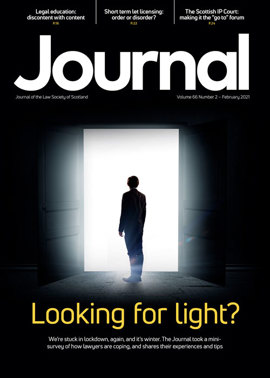Viewpoints: February 2021
How to stay email secure?
The increased risk endured by conducting ourselves digitally and by email has been obvious since March 2020.
I, and doubtless others in the profession, have seen a marked increase, both professionally and personally, in the number of emails with viral attachments and texts coming from third parties suggesting your account needs updated. I predict these instances will continue to grow, and become more convincing and effective.
My worry is that the many attachments we constantly receive from professional colleagues with innocuous attachments, could, with viral evolution, be sent by a third party and with devastating results.
How can we try to offset this very likely threat?
For the time being, perhaps in any communication with known colleagues, we in our email systems go back to the last transaction, and “reply” but rename the topic, so that we remain assured that the “historic” connection is reliable.
For the time being, we could further consider telephoning our professional colleagues, or seeking confirmation on headed paper, when we receive an email with no historic string. Most practitioners know each other, if not personally, then by voices over the phone.
It may be two years down the line before the hackers catch up, and we are forced to rethink. But they will catch up, and contemplating this inevitability, should, in my opinion, be addressed now.
Therefore, I question whether it is feasible that the Society develop a server, (with high upload/download speeds) where all digital exchanges between practitioners across Scotland; all lender and panel communications; are centralised and concurrently secured. Such a system would negate the need for the above noted verifications, and the multiple secure email logins that are currently driving us all to distraction.
In such a system each firm or practitioner would have a secure login, similar to online banking, to enter the server. Such a vehicle could secure all email exchanges, while offsetting evolving threats centrally.
The development of such a system could, with further evolution, include: the Society’s digital access to a firm’s software and accounts systems to effect regulatory compliance and audit, negating the need for regulatory inspections; centralising accounts software and systems, negating the need for each firm to purchase/update internal accounting and other software systems; a verifiable, transparent, and continuous monitoring of trends in the profession.
Ed Wright, Black & McCorry, Livingston
Regulars
Perspectives
Features
Briefings
- Criminal court: Discount season
- Family: Capital values in uncertain times
- Employment: Can employers require staff vaccination?
- Human rights: Protecting the child claimant
- Pensions: a bill with teeth
- Charities: commerce as public benefit?
- Property: Playing safe: on the right track?
- In-house: Wide world of in-house
In practice
- Priorities for our Parliament
- The Word of Gold: The gift that keeps on giving
- TRS: more trusts, more information, more access
- A proper conclusion
- The Eternal Optimist: Putting resolve into resolutions
- Appreciation: Professor Emeritus Robert Rennie
- Ask Ash: Trainee in a rut
- Royal Faculty invites new members






